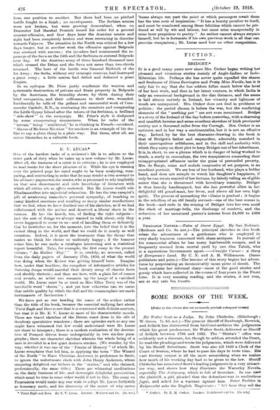FICTION.
BRIDGET:*
IT is a good many years now since Mrs. Croker began writing her pleasant and vivacious stories mainly of Anglo-Indian or Indo- Hibernian life. Perhaps she has never „quite equalled the charm and freshness of Diana Barrington and -Pretty Mies Neville, but-it is only fair to say that she has seldom fallen much below the level of her best work, and that in her latest venture, in which India is only an occasional background in the dim distance, and the aeons is 'laid almost entirely in Ireland, her vivacity and lightness of touch are unimpaired. Mrs. Croker does not deal in problems or polities : the period chosen is before the war, but the conflicting elements of the " seething pot " are not even mentioned. Bridget is a story of the Ireland of the day'before yesterday, with a: charming and unselfish heroine.and some excellent sketches of Irish provincial society not a thousand miles from the Curragh. Mrs. Croker is an optimist, and in her way a sentimentalist, but it is not an effusive way. Indeed, by far the best oharacter-drawing in the book is that of Bridget's father and stepmother, admirably matched in their unscrupulous selfishness, and in the skill and audacity with which they carry on their plot to keep Bridget out of her inheritance, It is, in short, to use a phrase which is in danger of beingworked to death, a study in camouflage, the two eonspirators concealing their misappropriated affluence under the guise of pretended poverty. Mrs. de Burgh, minx and ,nalade imaginaire of set purpose, is an excellent portrait. We see less of her husband, who plays a bolder hand, and does not scruple to wreck his daughter's happiness, if only he can retain control of her fortune, by falsely telling an eligible suitor that she is threatened with hereditary insanity. Bridget is thus heavily handicapped, but she has powerful allies in her delightful old grand-aunt, her lover, and above all her own high Efpirit. The process of unmasking the villains is gradual ; it begins in the rebellion of an old family servant—one of the best scenes in the book—and ends in the coming of Bridget into her own amid the clash of marriage-bells, the discharge of confetti, and the reduction of her unnatural parent's income from £4,000 to £400 a year.


































 Previous page
Previous page